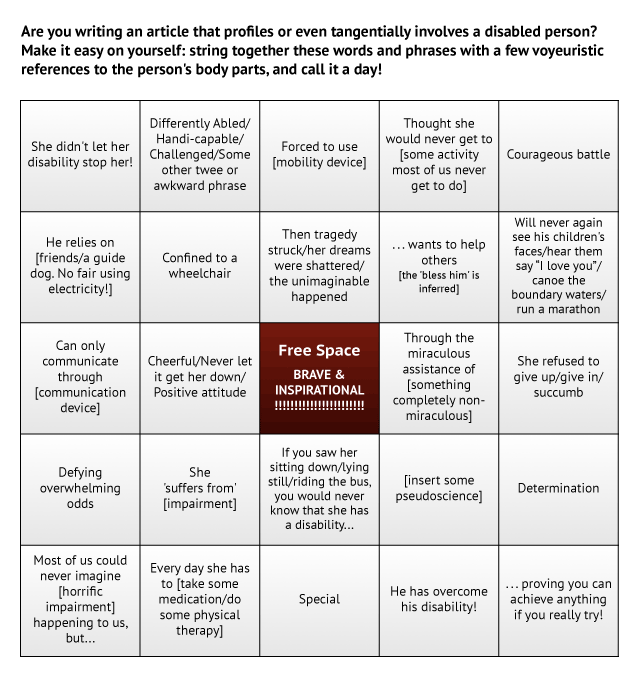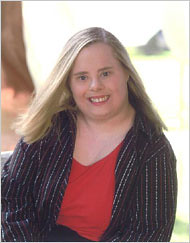I think I upset one of the newer employees at my favourite tea shop today. Most of the staff are used to my cynical reactions to newspaper discussions of how inspiiiiiiiiiiring people with disabilities are at this point.
But let me begin at the beginning.
Actually, no, let me begin with something important, since recent events have told me one cannot be too careful.
There is a certain way news media prefers to talk about people with disabilities. They like to tell our stories in a way that’s “inspiring”, that’s about making non-disabled people feel better about stuff. “Oh, look at how brave that person is, being all alive and stuff despite having a disability! I would rather be dead! That person/their parents/their loved ones are so brave and inspiring! I will now put issues of accessibility and disability out of my mind, because I have been inspired!”
These stories aren’t really about people with disabilities. They’re about making currently non-disabled people feel they know something, that they’ve been touched, that their lives could be suffering and badness, but look how lucky we all are. Look at the plucky crippled person, and be inspired. [This is, of course, why Helen Keller is reduced to “hand in water” stories.]
There are, of course, reasons why people with disabilities and their families participate in these stories, and I certainly don’t blame them. I know if someone offered to interview… wait, I’ve been interviewed a few times now about disability, and I did leap at the chance. I don’t think that people who are interviewed for these stories are doing anything wrong. They’re talking about their lives, and describing their experiences. No, it’s the way that these things are spun, the words being used by the reporters to fill in the gaps, that is the problem.
The tendency is so very very wide spread that Haddayr (with the help of Codeman) made a bingo card for us all:
Description written by Haddayr:
Are you writing an article that profiles or even tangentially involves a disabled person? Make it easy on yourself: string together these words and phrases with a few voyeuristic references to the person’s body parts, and call it a day!She didn’t let her disability stop her!
Differently Abled/Handi-capable/Challenged/Some other twee or awkward phrase
Forced to use [mobility device]
Thought she would never get to [some activity most of us never get to do]
Courageous battle
He relies on [friends/a guide dog. No fair using electricity!]
Confined to a wheelchair
Then tragedy struck/her dreams were shattered/the unimaginable happened
. . . wants to help others [the ‘bless him’ is inferred]
Will never again see his childrens’ faces/hear them say ‘I love you’ canoe the boundary waters/run a marathon
Can only communicate through [communication device]
Cheerful/ Never let it get her down/ Positive attitude
Free Space:
BRAVE & INSPIRATIONAL!!!!!!!!!!!!!!!!!!!!!!!
Through the miraculous assistance of [something completely non-miraculous]
She refused to give up/give in/succumb
Defying overwhelming odds
She ‘suffers from’ [impairment]
If you saw her sitting down/lying still/riding the bus, you would never know that she has a disability…
[insert some pseudoscience]
Determination
Most of us could never imagine [horrific impairment] happening to us, but…
Every day she has to [take some medication/do some physical therapy]
Special
He has overcome his disability!
. . . proving you can achieve anything if you really try!
So, let’s go back to my story.
I haven’t been following anything to do with the Olympics for reasons I won’t go into here, but I knew exactly what was going on when I glanced at Saturday’s Globe & Mail and saw this splashed across the front:
A Different Victory: When Alex Bilodeau’s brother cheered his gold, the triumph went more than one way. The skier and the painter find inspiration in each other – and neither one accepts limits. Ian Brown travels to the intimate heart of a family.
“Oh gosh!” I said to Don, in my overly chirpy sarcastic voice. “It’s going to be an inspiring crip story, I just know it! Quick, let us purchase this fine newspaper so we can be inspired!”
Poor dude behind the counter proceeded to tell me how inspiiiiiiiirng he found “the brother of the guy who won gold”, to which my response was… less so. “Inspiring crip stories irritate the fuck out of me.”
You know what would inspire me, gentle readers? Curb cuts being cleared of snow so Don & I could get across the street without having to go three blocks out of way first. But I guess when you’re a bitter, cynical, angry person who just hates fun, that’s what you get.
Sadly for all of us, Ian Brown’s articles don’t seem to appear on the Globe & Mail’s website (except perhaps behind the paywall), so I can’t let you read the inspiriiiiiiing story of Frédéric Bilodeau, but I can show you a BINGO card that Don & I filled out while we read it.
Description: As above, but with the following squares circled:
Differently Abled/Handi-capable/Challenged/Some other twee or awkward phrase
Forced to use [mobility device]
Then tragedy struck/her dreams were shattered/the unimaginable happened
Will never again see his childrens’ faces/hear them say ‘I love you’ canoe the boundary waters/run a marathon
Cheerful/ Never let it get her down/ Positive attitude
Free Space: BRAVE & INSPIRATIONAL!!!!!!!!!!!!!!!!!!!!!!!
She refused to give up/give in/succumb
If you saw her sitting down/lying still/riding the bus, you would never know that she has a disability…
Determination
Special
He has overcome his disability!
Of course, what Frédéric Bilodeau’s story has actually managed to inspire is awesome comments at the Globe & Mail like this one:
Proud for so many reasons
Alexandre Bilodeau has provided something more than his magnificent gold performance (Gold Comes Home – Feb. 15). He has provided an example of the role that individuals with a disability play inspiring us as they overcome their challenges.
Thank you, Alex and Frédéric.
Brian Smith, Toronto
Mr Smith, with all due respect, we are not here to be your thrice-damned inspirations thank you very much. Be inspired! Lobby the Canadian government to provide funding for all universities to be fully accessible to people with disabilities! That would help lots of people with disabilities overcome their challenges!
The point of this post isn’t “here I am, talking about an article you can’t read, and being as sarcastic as possible, aren’t I witty?”. It’s actually to talk seriously about the way disabled people are written about. We’re allowed to be inspiring stories of overcoming adversity – and often those stories focus on the difficulties our loved ones have, and how hard it can be to have a disabled person in your life – or we can be a passive victim of crime. That’s it.
If new media actually presented people with disabilities as we actually are… well, that, gentle readers, would be actual news.
ETA: facesofcathy found that Ian Brown’s article’s up over at CTV. (Why? I don’t know.) Check it out: The Bilodeaus: Elusive truths from an unforgettable family. I haven’t done a side-by-side comparison of the text (I think the headings are different?) but it look pretty close.
Check out the comments if you like to headdesk over how inspiiiiiiiired people find these types of stories.





 Cowra Guardian:
Cowra Guardian: